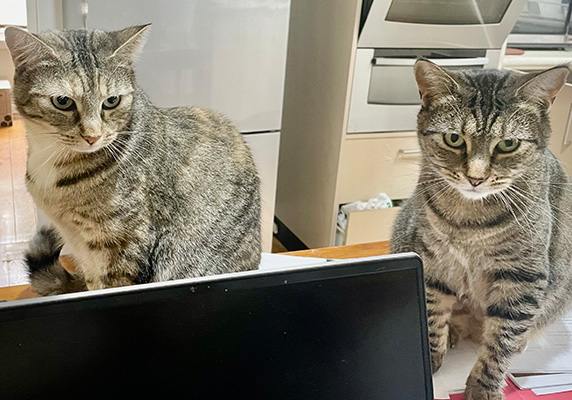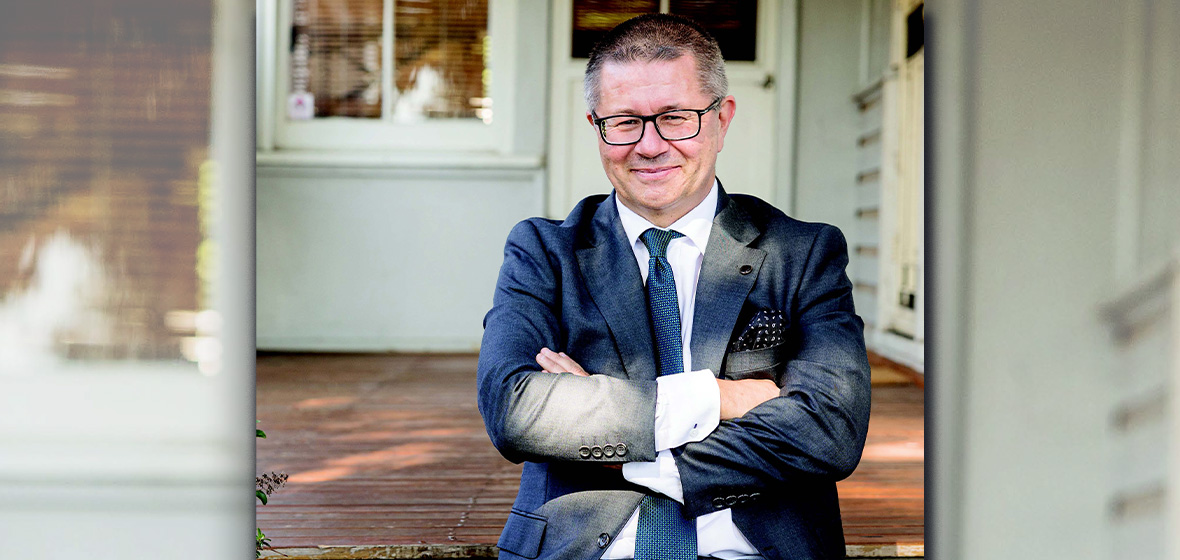For sole practitioner David Pheeney, building trust with clients is essential. He believes this is the key to achieving the best possible outcome for the client, and upholding the reputation of the legal profession.
Relaxed and benign, sole practitioner David Pheeney appears to have all the time in the world to talk to LSJ. The sense of tranquility comes in part from the peacefulness of his environment. The office for his law practice, attached to his house in Dubbo, is approached through a quiet garden enlivened by birdsong, and clients are greeted by his two office managers, his cats Reggie and Hermonie.
“I find if you have a companion animal around, it calms clients down,” Pheeney says.
Pheeney also travels around central western NSW for work, including to Wellington, Narromine, Bourke, Brewarrina and Cobar. His practice, which commenced in 2017, covers criminal law, traffic offences, AVOs, and pro bono work through the Justice Advocacy Service for clients with intellectual disability and domestic violence victims.
At Pheeney’s practice there are no signs declaiming his profession, and he sits on the same side of his desk as his clients do.
“Often the professions have this status, this perceived hierarchy. When you meet a client, they’re nervous, and you’re trying to develop trust and rapport. Sitting behind the desk and having the barrier between you is so impersonal,” he explains.
“It’s all about that relationship, about your client knowing you have their back and forming a bond. That’s so important, because win, lose or draw, if you don’t get the desired outcome, the client needs to know they’ve been listened to and valued.”
It’s all about that relationship, about your client knowing you have their back and forming a bond. … the client needs to know they’ve been listened to and valued.
Pheeney is acutely aware of the traditional pressures on the owner of a law practice: time restrictions and billable hours. But, he says, “I don’t have a big practice, big overheads. I do two or three cases a month. So I can give a person time, sit with them for an hour, and go through things slowly with them.”
What’s this fella about?
Pheeney came to the law quite late. “My mother’s side of the family are Indigenous, Wiradjuri, my father is non-Aboriginal. I was the first person in my family to go to university. And I did so after being pretty terrible in high school. I left school, did a lot of jobs, then it dawned on me that getting an education was a passport to a better life.”
Pheeney did an arts degree, and later studied law as a mature-age student at Southern Cross University. He was admitted in 2008.
Pheeney’s first job as a lawyer was with the Aboriginal Legal Service (ALS). He worked in Wagga Wagga as a junior solicitor for two years, and following this role took on the position of managing solicitor at the ALS in Bourke for seven years.
“To me that was my grounding,” he says. “In terms of the type of work you do, the complexity, the pressure, the expectations from community, the workload, that really prepares you. I often say to people, one year in the Aboriginal Legal Service is equivalent to three in private practice just by virtue of the type of things you’re exposed to – in terms of both training and practice.”
After a committals job with Legal Aid in Dubbo for 18 months, Pheeney took a placement with the Western Community Legal Centre (CLC).
“This exposed me to civil, family and consumer law,” he says. “But in those legal aid positions, each advice clinic was only 15 to 20 minutes long. I found it really difficult, because as Blackfellas we need time when we’re trying to ‘suss each other out. You’re thinking, what’s this fella all about, can I trust him?”
Working with the CLC made Pheeney aware that “criminal law intersected with many other areas of law. I was at a point in my career when I thought I’d give private practice a go.”
Connected with the community
Working in a regional community means your practice is not “private” in every sense of the word, Pheeney acknowledges. “At the end of the day, I live in this community. As a regional practitioner, when I walk up the street, I could be walking past that previous client. That’s one of the things you have to be aware of, because if you’re acting for a client or a family you need to do the right thing, be honest, show integrity, be appropriate.”
Pheeney remarks that he doesn’t need to advertise his services. “Being fair and reasonable with your clients, giving them a good experience, a good relationship, means they’ll tell their friends and family. My clients come by word of mouth.”
And it’s not only his own reputation he needs to maintain. “It’s something that we have a responsibility for: to uphold the reputation and the good standing of the profession, and as regional lawyers that is something we live and breathe every day.”
It’s something that we have a responsibility for: to uphold the reputation and the good standing of the profession.
‘Dust yourself off’
Pheeney is relaxed when he speaks with the LSJ, but he admits it’s sometimes a different story. “I’ve had quite a few cases involving child abuse, sexual assault, terrible things involving children, one where three children died in a motor vehicle accident. That case broke my heart. I ended up taking three and a half weeks off. These things sneak up on you, they come back into your head.”
When a confronting case comes up, Pheeney says, “you need to know you’re not infallible, you’re going to have days where you just feel terrible. And acknowledge those feelings and know you can’t use beer or smoking to forget things. Put your hand up and say, ‘I’m not coping very well at the moment, I need a break’. I think people understand that.
“I think the connections you make through family, friendships, professionally they are the things that are going to sustain you,” he adds. “When you fall over, you can call on that. That connection, that relationship you have, is going to help you get up, dust yourself off, get to back on the horse so you can move forward.”
Pheeney offers a parting invitation to his fellow solicitors, particularly those in sole practice: “Why wouldn’t you come to the regions? Yes, there are challenges, but there’s also our lifestyle. The social, professional and family connections you make give you a sense of closeness to clients and their families that you don’t get in a city.
“The beauty of being a regional lawyer is the relationship that practitioners have: we only act in areas where we’re competent. We refer our clients to each other. Together we help people to resolve multiple legal needs.
“That’s the profession working together, supporting each other.”

About sole practitioners in NSW
At April 2023:
- 40,397 solicitors in NSW held a practising certificate
- 3110 solicitors – 7 per cent – had an employment designation of sole practitioner
Their locations:
- 2,339 in the city/metro regions of NSW
- 739 in regional/rural areas
- 32 outside NSW
Their ages:
- 85 were between 25 and 35 years old
- 391 were between 36 and 45 years
- 576 were 45-55 years old
- 914 were between 56 and 65 years old
- 907 were 66-75 years old
- 237 were aged 75+ years




